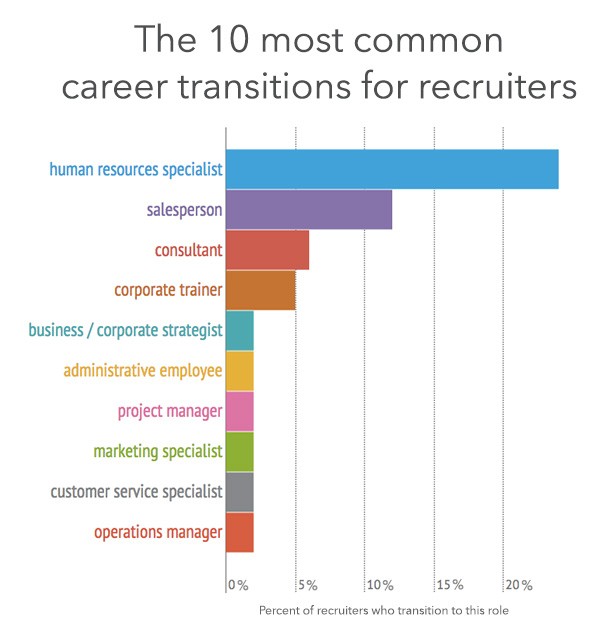If You Left Your Recruiting Job, You’d Be a…
We aren’t trying to plant any rebellious ideas in your head. Not at all.
Recruiting is as intense and busy as it is fun and rewarding. And at the end of the day, you walk out knowing you have made a difference in somebody’s life.
But if you were to leave your job and switch careers, we’ve got a pretty good guess what your next job would be. We recently analyzed the profile data of 94 million LinkedIn members, and identified the most common career transitions across different industries.
Here they are for recruiters:
Note that going from being a recruiter to an HR specialist is by far the most popular move – it accounts for 25% of all transitions. The second most popular move, to sales, accounts for 11%. As you go farther down the list, these transitions become less and less common.
Do you think these moves make sense or were they surprising?
What are the most common career moves for professionals
If you are curious about the drastic career moves across other professions, check out our interactive chart created by developer Skye Riley and research consultant Sohan Murthy. This could be a handy guide for you when talking to a stellar candidate who is hesitating about making a drastic career move. Just select a job title in the drop down on the right, and watch the graph change:
A quick guide to the interactive visual:
- Colors represent careers that lead to similar transitions.
- The size of the dots represents the number of careers that transition into this role.
- The thickness of the line represents the number of LinkedIn members who have made that move.
As we were sorting through the information in the graph, a few things jumped out that you should keep in mind:
- All roads lead to sales. Leaving a job to start a career in sales was by far the most common career transition. Next time you recruit for a sales role, don’t ignore candidates with no previous sales experience – you may be severely limiting your talent pool.
- Veterans have the most varied career paths. While this is not surprising, it’s inspiring to see the breadth of skills that veterans possess. To give you a taste of the diversity, a few of the roles that military members transition to are police officers, business owners, and corporate strategists.
- Specialists are least likely to change careers. Our data shows that people who have spent a lot of time and energy specializing in a narrow field are less likely to switch jobs. Doctors, lawyers, and software engineers all fall into that category. It’s safe to say that even a nice sales job won’t sway this demographic.
This research is part of LinkedIn’s efforts to map out the global economic graph.
Methodological details: The results of this analysis represent the world seen through the lens of LinkedIn data. As such, it is influenced by how members choose to use the site, which can vary based on professional, social, and regional culture, as well as overall site availability and accessibility. These variances were not accounted for in the analysis.
We grouped the millions of unique, user-defined job titles found in the experience section of LinkedIn member profiles (including non-English profiles) into roughly 300 career categories. For example, the “flight crew” career includes titles like “flight instructor” and “airline pilot.”
From there, we looked for instances where a member’s current career category is different than the career category in the position immediately preceding it. Members who hold multiple current careers or indicated multiple career transitions were excluded from our analysis. Finally, the most common transitions for each career were isolated and displayed in the graph above. A clustering algorithm was utilized to color and position the career dots, based on their degree of overlapping transitions.
Topics: Data insights
Related articles




